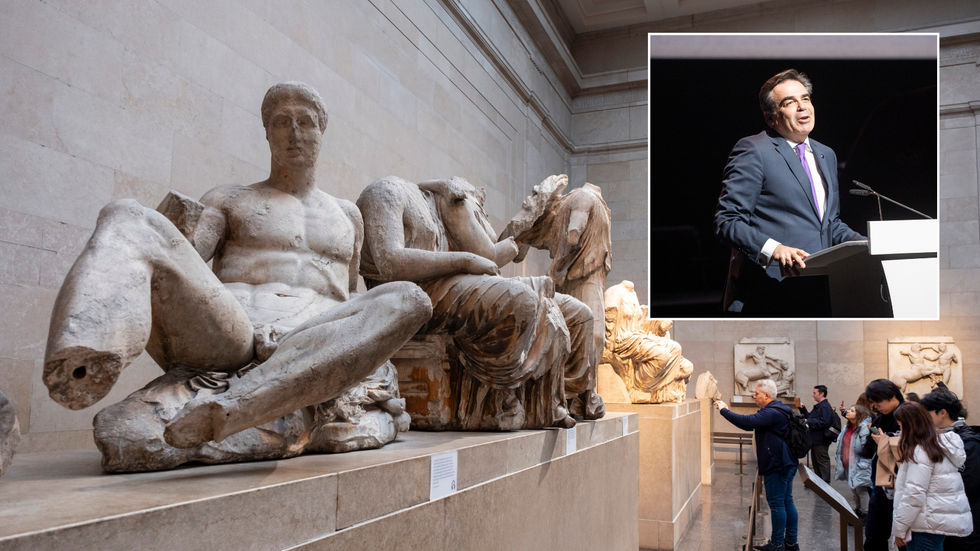Britain must return Elgin Marbles to ‘open a new era of mutual respect’ with Brussels, ex-EU chief says
A former European Commission chief has urged Sir Keir Starmer to return the Elgin Marbles to Greece as a gesture to reset UK-EU relations after Brexit.
Margaritis Schinas, who served as Commission vice-president under Ursula von der Leyen until December 1, suggested the move should coincide with the 200th anniversary of Lord Byron’s death in 2024.
Speaking to The Telegraph, Schinas said the return of the Parthenon sculptures would help end divisions caused by Brexit and usher in a new era of “mutual respect and collaboration”.
Schinas, who previously served as the Commission’s chief spokesman during Brexit negotiations, emphasised the symbolic importance of the timing.

“2024 is 200 years from Lord Byron’s death in Missolonghi. There could be no better time for a meaningful gesture that signals a new chapter in our historic partnership,” he said.
“Returning the Marbles would be a powerful symbol of Britain’s commitment to strengthening ties and turning the page on recent divisions,” Schinas added.
The former commissioner was nominated to his EU role by Greek Prime Minister Kyriakos Mitsotakis.
The Elgin Marbles are a collection of sculptures, inscriptions and architectural features said to have been acquired by Lord Elgin between 1801 and 1805 – something which the Greeks refute.
MORE LIKE THIS:
- Elgin Marbles row twist as Greece reminded of holiday hotspot that ‘belonged to Britain’
- ‘We have to respect this!’ Elgin Marbles row heats up as GB News guest fumes ‘we will take our islands back’
- Elgin Marbles WILL be given back to Greece within ‘next few years’, claims expert
Lord Elgin faces accusations of stealing the artefacts or bribing officials to remove them from the Acropolis.
Approximately half of the collection is housed in the British Museum, which maintains that the marbles were legally purchased from the Ottoman Empire, which ruled Athens at the time.
The British Museum insists it has legal ownership of the sculptures, with decisions about their care and management resting with the museum’s trustees, who operate independently of the Government.
In December, Greek sources indicated progress had been made in retrieving the Marbles following Sir Keir’s meeting with the Greek Prime Minister in London.
However, Downing Street insisted the Marbles were not discussed during the meeting and maintained there were “no plans to change the law” permitting their permanent removal.
The issue has caused recent diplomatic tension, with Rishi Sunak cancelling a meeting with Mitsotakis in 2023.
The cancellation came after the Greek PM compared removing the Marbles to cutting the Mona Lisa in half.
Starmer has moved to forge closer ties with the EU since his election victory in July, with a UK-EU summit expected in Brussels in early 2025.

The Government seeks to improve the Brexit trade deal, secure a veterinary agreement, and negotiate better terms for British touring artists.
The EU is open to a security agreement while seeking a youth mobility deal and continued access to UK fishing waters.
Diplomatic sources have emphasised the need to rebuild trust between the EU and UK following tensions with successive Tory governments that brought threats of a trade war.
The Government has ruled out rejoining the single market or EU freedom of movement rules.
Schinas highlighted the deep historical connections between Britain and Greece.
“Greece and Great Britain share a long and cherished history. Britain played a pivotal role in the liberation of Greece from the Ottoman Empire and in the creation of the modern Greek state,” he said.
He noted how both nations “stood united in two World Wars, defeating fascism and upholding the ideals of freedom and democracy.”
Lord Frost, the former Brexit negotiator, had previously supported returning the Marbles, suggesting in December 2022 that it could be a “grand gesture” to build a new Anglo-Greek cultural partnership.
The British Museum has indicated that discussions about a potential “Parthenon Partnership” remain “ongoing and constructive”.
Such a partnership could form the basis of an agreement between the Greek government and the museum, potentially allowing the return of the Marbles in exchange for exhibitions of famous artworks.
If the Marbles were to return to the Acropolis, reports from December suggest their space in the British Museum could be filled by perfect replicas created by robot sculptors.

